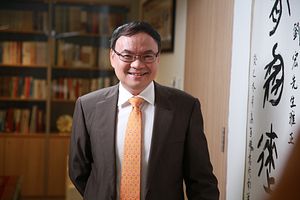Governments and public sectors worldwide are facing unprecedented political, social and economic challenges. Although these challenges manifest in different ways, depending on the culture and setting, one of the most effective ways to address them is through superior governance, a paradigm that calls for strengthening government capacity and competency, stakeholder engagement, and collaboration in public administration and public policy.
Globalization can seem far removed from our work and lives, but in fact it is highly relevant to our future and to good governance. Understanding and taking globalization into account is the first step towards improving the world through better governance. Talent management is an integral part of human resources development in both industrialized and developing countries. At a time of accelerating globalization and the advent of the knowledge economy, talent management (including recruiting, nurturing and assessing of talent) becomes a defining characteristic of a nation’s competitiveness.
My research focuses on globalization and its implications for international talent strategies, with special reference to Asian countries. What this research reveals is that no country can escape the ubiquitous impact of globalization on talent acquisition and mobility.
The impact of globalization on the talent management strategies of governments both domestic and international is shown perhaps most clearly in both the “war for talent” and the “brain drain.” Countries such as Singapore, China, the United States, the United Kingdom, the Netherlands, and Japan – I have had the good fortune of spending at least two years either as an international student, researcher or professor in each of those countries – are all trying effective talent strategies to meet these challenges, with varying degrees of success.
Talent strategies don’t just have implications for domestic and global talent; they also influence the public policies within which talent mobility is situated. It is vital to take into account different patterns of reactions of global talent to different government initiatives. It is imperative to understand the policies and policy mechanisms countries use to recruit and nurture the high-caliber talent that forms the backbone of the international knowledge economy.
This year Singapore celebrates its 50th birthday. The success of Singapore is in large part attributable to the relevant and flexible talent strategies it has adopted across several key developmental stages. Singapore as an island- and city-state has primarily been built by local and international talent in various industries.
My case study of Singapore reveals that new Chinese migrants have played important roles in talent mobility and relocation. The Singaporean government has successfully harnessed these migrant cohorts, who in turn have reshaped the dynamics of Singapore’s economy and society.
To manage talent in an era of globalization, leaders must acquire critical analytical and written skills to assess the formation and outcome of talent policies and their broader socio-political impact. Without a comprehensive understanding of the domestic and international imperatives, leaders will have little chance of making sound policy recommendations for talent management.
It is crucial to equip the next generation of public leaders with a global vision to meet new challenges in policymaking and public governance in a rapidly changing world, combining theory and practice with an emphasis on public policy and administration. Leaders dedicated to enhancing the quality of governance in today’s globalizing world must be armed with cutting-edge research and knowledge, and must have extensive engagement and immersion in the policy community. For instance, China is a giant player in the global arena, and understanding and engaging China is imperative in pursuing better public governance.
Future leaders in the public, private, and non-profit sectors will be expected to address important policy and administration issues with a global perspective and a focus on Asia. They must truly understand globalization and its ramifications, and be able to make appropriate policy recommendations. Whether leaders are prepared for these challenges and properly understand the key concepts in globalization and its impact on talent mobility and recruitment will largely determine the long-term outlook for national competitiveness.
LIU Hong is Tan Kah Kee Professor of Asian Studies and Chair of the School of Humanities and Social Sciences, and Director of the Nanyang Centre for Public Administration, Nanyang Technological University.

































